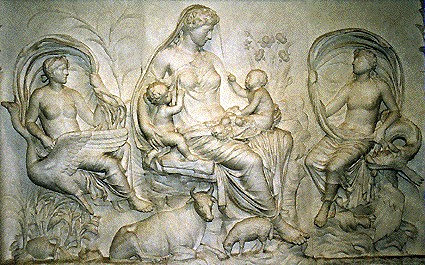I have in this ongoing series been investigating the wisdom of myth as it informs what I call a potential "new awakening" of spirituality in our society. I take as one of my main reference points the book and PBS television series The Power of Myth, in which, during the mid-1980s, Bill Moyers interviewed at great length the scholar of comparative mythology Joseph Campbell.
Joseph Campbell tells Bill Moyers in The Power of Myth that a new mythology is needed today. Even Campbell doesn't know what precisely it will be:
“You can’t predict what a myth is going to be any more than you can predict what you’re going to dream tonight. Myths and dreams come from the same place. They come from realizations of some kind that have then to find expression in symbolic form.”
 |
| Planet Earth |
Still, the broad outlines of what that new myth will be are plain. It will be, Campbell says, a mythology of the whole planet:
“And what it will have to deal with will be exactly what all myths have dealt with — the maturation of the individual, from dependency through adulthood, through maturity, and then to the exit; and then how to relate to this society and how to relate this society to the world of nature and the cosmos. That’s what the myths have all talked about, and what this one’s got to talk about. But the society that it’s got to talk about is the society of the planet. And until that gets going, you don’t have anything.”
"The society of the planet" is something of which Campbell's prognosticated mythic conception was dealt a near-mortal blow when al-Qaeda hijacked American jets and crashed them into the Twin Towers of the World Trade Center in New York on 9/11/2001.
 |
| New Amsterdam in 1664 |
Campbell's view that there is a planet-encompassing society a-forming, one which will be accompanied by an appropriate planet-wide mythos, is cosmopolitan — as cosmopolitan as New York City has historically been, actually and symbolically, since a Dutch colony called New Amsterdam was founded as a trading center on Manhattan Island in 1625.
I'd say we today remain collectively unmoored, spiritually speaking, so long as we don't yet have a myth of the whole planet serving to anchor us in a symbol-rich narrative of who we are today.
The headlines on this particular day find President Obama in Europe attending a summit of G-8 leaders at which they wish to discuss new trade agreements to promote mutual prosperity. They will likely find themselves distracted by scuffles over such matters as the two-year-old civil war in Syria, with its attendant spillover of refugees and angst into neighboring countries, including Greece as a portal into a wider Europe; the looming problem of global warming and climate change, which no one seems able to find the political will to address substantively; and other issues such as what to do about the lingering economic woes in Europe and the United States.
 |
| Ground Zero |
At home, Obama is still wrestling, so far unsuccessfully, with how to fulfill his promise to close the prison for suspected Islamist terrorists at Guantanamo Bay, Cuba. We quite understandably fear the rise of Islamism in today's world, which is our basic context for understanding recent events in Syria, in Libya, in Egypt, in Iran, in Iraq, in Afghanistan, in Bosnia. It is hard to dream big enough to generate a new mythos as long as we are haunted by the spectre of Ground Zero, no?
Islamism is not — repeat, not — representative of Islam, the great religion of which it is a demonic parody. Yet Islam is an Abrahamic religion rooted in the same prehistory that gave us the Hebrew and Christian scriptures. Campbell says of that scripture that it — unfortunately, if we need to radically change mythic course today — saddled us with a "biblical condemnation of nature”:
“God is separate from nature, and nature is condemned of God. It’s right there in Genesis: we are to be the masters of the world.”
If Biblical myth is holding us back today, what's the antidote? Campbell tells Moyers:
“But if you will think of ourselves as coming out of the earth, rather than having been thrown in here from somewhere else, you see that we are the earth, we are the consciousness of the earth. These are the eyes of the earth. And this is the voice of the earth.”
 |
| Gaia in Greek Mythology |
Science has told us, Moyers mentions, of the Gaia Principle. Campbell calls it the notion of “the whole planet as an organism.” Gaia (pronounced GUY-uh or GAY-uh) was the Greek goddess of the Earth. The Gaia Principle is the somewhat controversial scientific hypothesis that all things on Earth, living or nonliving, are interconnected in such a way as to (says Wikipedia) form “a self-regulating, complex system that contributes to maintaining the conditions for life on the planet.” So when we humans get too big for our britches and start polluting the atmosphere with carbon dioxide, the oceans respond by taking up carbon and becoming more acidic — which is fine for some sea creatures but very bad for coral reefs.
If we see ourselves as "masters of the world," do we care about the odd coral reef here and there? We ought to. We are suffering from a spiritual "vitamin deficiency." We can't regain full health until we dream our new myth.
Yet we can't do that while the civilized world is fighting off jihadists at every turning, killers wedded to a twisted version of the old scriptural mythos that seems to nominate a singular, beloved-of-God "us" and an infidel "them," where the "them" must be stamped out by any means whatever. Jihadists insist on being "masters of the world" on their own bloody terms.
Meanwhile, Gaia herself is in huge trouble, climate-wise. Stay tuned for more fallout from that ...

No comments:
Post a Comment